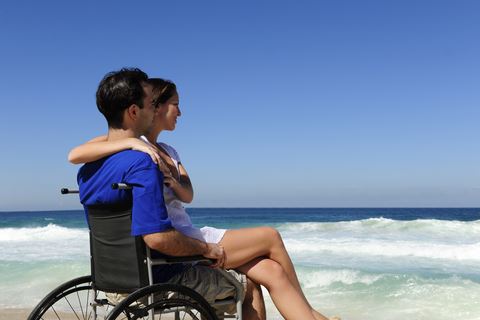People often have questions about sex and disability. Those questions and inexperience often lead to a presumptions that just are not true. Below is an excerpt from The Ultimate Guide to Sex and Disability. This will help you understand the 13 most common myths related to this subject.
- Myth #1: People with Disabilities and Chronic Illnesses are Not Sexual
- Myth #2: People with Disabilities and Chronic Illnesses are Not Desirable
- Myth #3: Sex Must Be Spontaneous
- Myth #4: People with Disabilities and Chronic Illnesses Can’t Have "Real" Sex
- Myth #5: People with Disabilities and Chronic Illnesses are Pathetic Choices for Partners
- Myth #6: People with Disabilities and Chronic Illnesses Have More Important Things Than Sex to Worry about
- Myth #7 and Myth #8: People with Disabilities and Chronic Illnesses Are Not Sexually Adventurous or They Are Perverts
- Myth #9: We All Get What We Deserve. We Can Always Do More to Help Ourselves
- Myth #10: People Living in Institutions Shouldn’t Have Sex
- Myth #11: Sex Is Private
- Myth #12: People with Disabilities and Chronic Illnesses Don’t Get Sexually Assaulted
- Myth #13: People with Disabilities and Chronic Illnesses Don’t Need Sex Education
Myth #1: People with Disabilities and Chronic Illnesses are Not Sexual
Once or twice a year, a journalist "discovers" the idea of sexuality and disability and decides it will make a great human interest story. Other than this, we rarely find media depictions of people living with disabilities or chronic illnesses as people who have sex lives. If we do, it is usually presented as a rare and incredible thing.
We think this happens for two reasons. First, there is a belief held by many nondisabled people that they will never become disabled. By distancing themselves from all things related to disability, they manage to stay in denial. Second, there is the fact that many nondisabled people view people living with disabilities as essentially different from them. They think disabled people are helpless (because many may need help). Therefore, those who are disabled are like children and are not acknowledged as sexual beings. You may have sixty years’ worth of life experience with the body, brain, temperament, and libidoof an adult. However, if you can’t feed yourself, need help wiping your ass, or getting in and out of the car then you are considered a child. Thus, sexuality for the disabled person is often denied.
In North American culture, self-sufficiency is highly prized. It is defined as the ability to do everything for yourself—and still have energy left over to help those poor unfortunates who are not as self-sufficient as you! It is not defined as the ability to work creatively and cooperatively with others.
Myth #2: People with Disabilities and Chronic Illnesses are Not Desirable
We’ve all been fed the message that sex is for the young and beautiful. If you don’t resemble a 23 year old supermodel, no one will want you. Likewise, if you cannot produce multiple G-spot orgasms on cue or perform like a stud, you’re not worth going to bed with. Even worse is the notion that if you require some help with assistive devices or if you need a little extra patience, communication, and emotional support before you can enjoy giving and receiving sexual pleasure, you’re a burden. Who would want you? This standard exists for everyone regardless of whether or not they have a disability and it harms us all.
Myth #3: Sex Must Be Spontaneous
We’re taught that sex is supposed to be spontaneous; it is something that just comes naturally (like "true love"). This is another belief that is damaging to everyone. This belief presents an even bigger problem for people living with disabilities because any amount of planning makes sex not spontaneous. Believing in this myth pretty much ensures a lousy sex life.Sex has many meanings. At its heart, sex is a process of communication. Whether we are flirting from across a crowded room, giving someone head for the first time, or making love while listening to a piece of music that totally turns us on the act of being sexual is about contact with ourselves and our surroundings. The idea that this process can happen without thinking, talking, or planning is ridiculous.Maybe we are willing to buy into the myth of sexual spontaneity because talking about our desires is difficult. It’s risky and it makes us feel exposed and vulnerable. Often, vulnerability is equated with weakness.
Myth #4: People with Disabilities and Chronic Illnesses Can’t Have "Real" Sex
Watch any one of the thousands of mainstream porn films (or even regular films with sex scenes) released each year and you’ll get some idea of how sex is "supposed" to work. "Real" sex progresses from light activities like kissing to the "real" thing, penis-in-vagina intercourse, and simultaneous orgasms in 10 minutes or less. You should also be able to have sex in a variety of different positions all in the same night. Everything we do sexually is supposed to progress toward that goal, and none of it is as important as the result itself. Thus, "foreplay" is nothing more than a prelude to the main event. Oral sex is hot, but it’s still not as good as the "real" thing.
According to this way of thinking, masturbation doesn’t count as sex. Only people who can’t get laid masturbate. Of course, studies (not to mention our own experience) tell us this is not true. People of all genders and sexual orientations masturbate regardless of relationship status! Some of us even masturbate with our partners. Most of us were raised with at least a few negative messages about pleasing ourselves sexually. One message is that orgasms experienced alone aren’t as fulfilling as those had with a partner. Unfortunately, the taboo against self-pleasure is deeply ingrained in us. This taboo flares to a fevered pitch if someone needs help to get off on his or her own.
So, only intercourse leading to orgasm is considered "real sex." Within that idea lies a belief that no one living with a disability is capable of having intercourse. The truth is that the majority of people with a disability can have intercourse. Those who can’t, or choose not to, can still have real sex.
Myth #5: People with Disabilities and Chronic Illnesses are Pathetic Choices for Partners
This myth reveals a deep bias. If you live with a disability or chronic illness, you must be a pitiable creature. Additionally, if someone feels so poorly about you, then you must feel worse about yourself. Why would someone want to choose a lover with such a lousy self-image?
The even more dangerous underlying idea is that if you live with a disability, whatever you happen to feel about yourself or think about the world on a particular day must be related to your disability. If you’re a real complainer who likes to kvetch and make everyone’s life miserable, it surely must be because you have a disability. On the other hand, if you are always cheerful and look on the positive side of things, that too must be indicative of what a trooper you are. After all, you're happy in spite of living such a terrible existence. Of course, we all have good days and bad days. However, when you live with a visible disability or chronic illness, whatever you are on a given day is believed to be a result of your condition.
Related to this is the deeply disturbing idea that living with a disability is a life not worth living. We’re taught to feel sorry for anyone who cannot achieve "good" health. Basically, that is the absence of any condition that makes you different from anyone else. If we believe that people who live with disabilities are helpless, powerless, and dealing with unnatural burdens then few options are open to those with disability. None of the options involve being in a satisfying sexual relationship.
Myth #6: People with Disabilities and Chronic Illnesses Have More Important Things Than Sex to Worry about
Who says sex isn’t important? Well, just about everyone in a position to teach us about sex manages to subtly convey the message that sex is a frivolous indulgence. It is certainly not something responsible citizens need unless we’re talking about the serious business of procreation.
The point is made again and again that if you live with a disability or chronic illness, you’ve got more important things to deal with besides sex. Sex is a luxury you simply can’t afford. This is also tied into the idea that people living with disabilities are childlike and need to be told how to prioritize their lives. Many nondisabled people hold this attitude, and even certain disability-rights activists claim that talking about our individual issues is bad because it "fragments the cause."
Myth #7 and Myth #8: People with Disabilities and Chronic Illnesses Are Not Sexually Adventurous or They Are Perverts
These myths are two sides of the same coin. On one side, if you live with a disability, it is assumed that you are passive. This assumption is generalized to all areas in life. It is taken for granted that people living with disabilities are sexually passive and not initiators. People can’t imagine that someone who uses a wheelchair might want to be tied up and spanked or that a man with no legs gets off dressing up as a ballerina. A second layer of meaning related to this myth is the idea that all anyone wants is to be just like everyone else. So, to those seen as different in some major way, it is particularly important that they pass as "normal." We all know that "normal" people don’t like to dress up or get spanked, right?
The "pervert" myth is the other side of the coin. It paints a picture of the dirty old man with the cane who eyes all the young, nubile people in the park. Ageism and disability often go hand in hand in a way that marginalizes people. Underlying both of these myths is the notion that people living with disabilities and chronic illnesses are "other" and that for them to have any interest in sex is perverted.
Myth #9: We All Get What We Deserve. We Can Always Do More to Help Ourselves
Whether we believe in karma or a simple do-unto-others philosophy for daily living, most of us are taught to believe that good things will happen to good people and that bad things happen to bad people. Thus, it follows that if you have HIV, use a wheelchair, or have trouble breathing then it's because bad things happen to bad people.
So, if we are experiencing too much pain to enjoy sex, there must be a reason. This irritating message often comes in the form of well-meaning suggestions from friends and family about doctors, chiropractors, naturopaths, herbalists, massage therapists, talk therapists, and other specialists. Maybe we should try this or that and then we’ll be better or perhaps even OK. This is no different from the habit most of us have of blaming the victim by wondering or overtly asking "Are you really doing enough to change your situation?"
The reality is that no matter how much we love ourselves and no matter how skilled we become at negotiating the particulars of our self-care, some of us experience physical pain that won’t go away. That pain becomes a fact of our lives. With life often comes pain—as unacceptable as this idea is to many people.
Myth #10: People Living in Institutions Shouldn’t Have Sex
One of the greatest barriers many people living with disabilities face when trying to develop a positive sexuality is a lack of privacy. Nowhere is this more evident than in institutions like rehab hospitals, hospices, group homes, and nursing homes. Most such institutions systematically deny residents the right to be sexual whether alone or with others. There are no locks on doors and no privacy. The right of staff to treat people as objects to be carted around, talked about in the third person even in their presence, and controlled are just a few of the ways that institutions make it clear that sexuality is not acceptable for its inhabitants. The underlying belief is that people’s behaviors must be monitored because they are incapable of monitoring themselves.
This leads us to the next myth.
Myth #11: Sex Is Private
If we were taught anything about sex at all when we were younger, many of us learned that sex is something private and that it is inappropriate to talk about it or do in front of others. Privacy becomes a requirement for sexuality.
For someone living in an institution, using attendant services, or needing the assistance of someone else to facilitate communication, privacy is a completely different reality. The definition of privacy changes when you have no lock on your door or when you request private time at a specific hour knowing that it will probably be written down in a log-book. This myth is one of those "no-win situations" because we’re told that real sex is a private matter and, guess what, you can’t have that kind of privacy.
Myth #12: People with Disabilities and Chronic Illnesses Don’t Get Sexually Assaulted
If you aren’t seen as sexually desirable in our culture, you won’t get sexually assaulted, right? Wrong. People who live with physical disabilities are far more likely to be victims of sexual assault than those who don’t live with physical disabilities. Some statistics suggest that people living with disabilities are two to ten times more likely to be assaulted than those who do not have disabilities.
This abuse ranges from pervasive power abuses by medical and rehabilitation staff to rape and other forms of sexual assault, forced confinement, physical abuse, and more. Supports for disclosure of the abuse, legal action, and counseling are scarce for people living with disabilities. This is especially true in institutions that maintain a culture of secrecy and keeping things private, which in turn allows more opportunities for other forms of abuse.
This myth sets up one of the most horrific, self-perpetuating cycles: If you are not at risk, why bother creating programs for prevention and support? This attitude places you at greater risk, and the cycle continues.
Myth #13: People with Disabilities and Chronic Illnesses Don’t Need Sex Education
The false beliefs outlined tend to build on each other. So, if people with disabilities aren’t considered sexual, then there is no reason for sex education. Sexual ignorance is an enormous obstacle for anyone who is trying to figure themselves out sexually. The situation is made worse when people are systematically denied access to the little bit of sex education that most people receive.
Another layer of this idea is the belief that if you tell someone about sex, they will immediately become fucking machines. Few things scare the nondisabled public more than the idea of people living with disabilities reproducing. This is especially true for people who live with intellectual and developmental disabilities. For those living with other types of disabilities, there are huge obstacles to having children. Part of what motivates people to deny sex education programs to people living with disabilities is the perception that such programs will open up a can of worms which the nondisabled professionals will "have to deal with" because those living with disabilities will be incapable of handling it responsibly and it will become someone else’s problem.
With very few exceptions, sex education programs designed for people living with disabilities take a cookie-cutter approach to sexual response. If you have an SCI at such and such a level, then this model is what you can expect for your sexuality. If you’re 70 years old and just had a stroke, then your sexuality will look like this.
- Myth #1: People with Disabilities and Chronic Illnesses are Not Sexual
- Myth #2: People with Disabilities and Chronic Illnesses are Not Desirable
- Myth #3: Sex Must Be Spontaneous
- Myth #4: People with Disabilities and Chronic Illnesses Can’t Have "Real" Sex
- Myth #5: People with Disabilities and Chronic Illnesses are Pathetic Choices for Partners
- Myth #6: People with Disabilities and Chronic Illnesses Have More Important Things Than Sex to Worry about
- Myth #7 and Myth #8: People with Disabilities and Chronic Illnesses Are Not Sexually Adventurous or They Are Perverts
- Myth #9: We All Get What We Deserve. We Can Always Do More to Help Ourselves
- Myth #10: People Living in Institutions Shouldn’t Have Sex
- Myth #11: Sex Is Private
- Myth #12: People with Disabilities and Chronic Illnesses Don’t Get Sexually Assaulted
- Myth #13: People with Disabilities and Chronic Illnesses Don’t Need Sex Education




